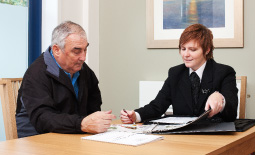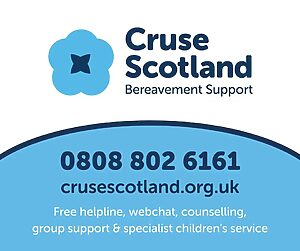What to do when someone dies can be very challenging, and there are various things you’ll need to do when someone dies. Some of which will vary depending on where and how they died.
Whilst this may look daunting at an already difficult time, you may be able to get other family members and friends to help out with some things. In addition, we’ll provide as much support and guidance as we can to make things as simple as possible. You can call us anytime day or night on 0800 996 1927.
What to do when someone dies at home
When someone dies at home you’ll need to contact their family doctor, GP, who will come to the house as soon as they can. Once they have established a cause of death they’ll issue a Medical Certificate (Medical Certificate of Cause of Death, Form 11) – they may not be able to give you this right away, so you might have to collect it from their surgery later.
The doctor will also send the Form 11 electronically to the registrars, this will enable you to complete the Registration of the death, which in Scotland should be completed within 8 days of death. However, if the doctor cannot determine the cause of death and further investigation is required, the registration will be delayed. This is quite normal and is nothing to be concerned about.
Once the death has been verified, you can contact us to arrange to bring your loved one into our care. You can call us anytime day or night on 0800 996 1927.
Our dedicated team will arrive at your home at anytime day or night in one of our specialised private ambulances. They will ensure the dignity of your loved one while they are being cared for and answer any initial questions you may have. They will leave you with details of our funeral arrangement services and tell you where your loved one will be looked after whilst in our care at one of our three mortuary facilities.
What to do when someone dies suddenly or unexpectedly
Sometimes a report may need to go to the Procurator Fiscal – please don’t worry if this happens, it is quite common when someone dies suddenly. There are many reasons why a report is sent to the Procurator Fiscal – such as it may have been a long time since they had been seen by their GP. Sometimes the Police may also be brought in, whilst this can be upsetting it is nothing to worry about, it is simply a part of normal procedures.
What to do when someone dies in hospital or in a care / nursing home
The sister in charge at the hospital will normally deal with certain things when this happens – for example, they’ll arrange for the doctor to issue the Medical Certificate and for it to be sent electronically to the registrar so you can complete the registration of the death. If the person dies in a hospital, then the staff may assist with contacting us, but would normally leave you to make contact and let us know that someone had died. We would take the details and then make arrangements directly with the hospital to bring the deceased into our care.
A care or nursing home will ask you which funeral directors you want to use, and they will normally make contact with us and arrange a time for us to attend to bring your loved one into our care. We will then contact you to start making the funeral arrangements.
Contacting your Funeral Director
You should try to contact your Funeral Director as soon as you can – you can contact us at any time of the day or night, so as soon as you feel able to call us, please do. Please either call 0800 996 1927 or one of our office telephone numbers. Our team are here to support you in anyway they can, and answer any questions you or your family may have.
When you get in touch with us, we’ll ask you a few questions about you, about the person who has died and where they died. The death does have to be confirmed by a medical professional, but you don’t need to have the Medical Certificate to get in touch with us.

Contact the Registrar
Once the Medical Certificate (form 11) has been issued by the doctor it will be sent electronically to the registrar, enabling you to register the death. You cannot hold the funeral until the death has been registered.
Further Support and Resources
The loss of a loved one is one of the most difficult times of our lives, there are many organisations available to help by providing further support and resources.
Cruse Bereavement Scotland
If you would like to talk to someone then Cruse Bereavement Scotland could be of assistance, they do provide professional support for bereaved adults, children and families across Scotland.
You can contact Cruse Bereavement Scotland on 0808 802 6161 (calls are free) available Monday to Friday 9am to 8pm and weekends 10am to 2pm.



